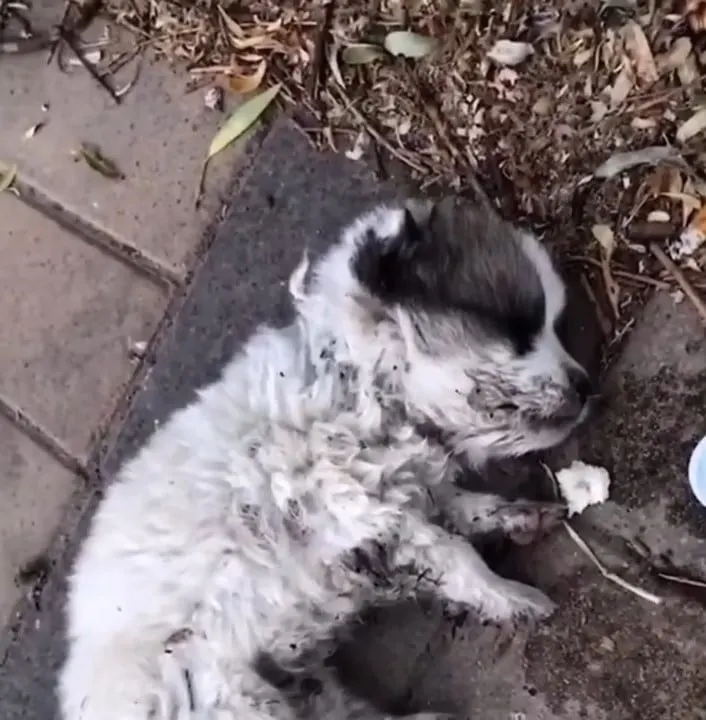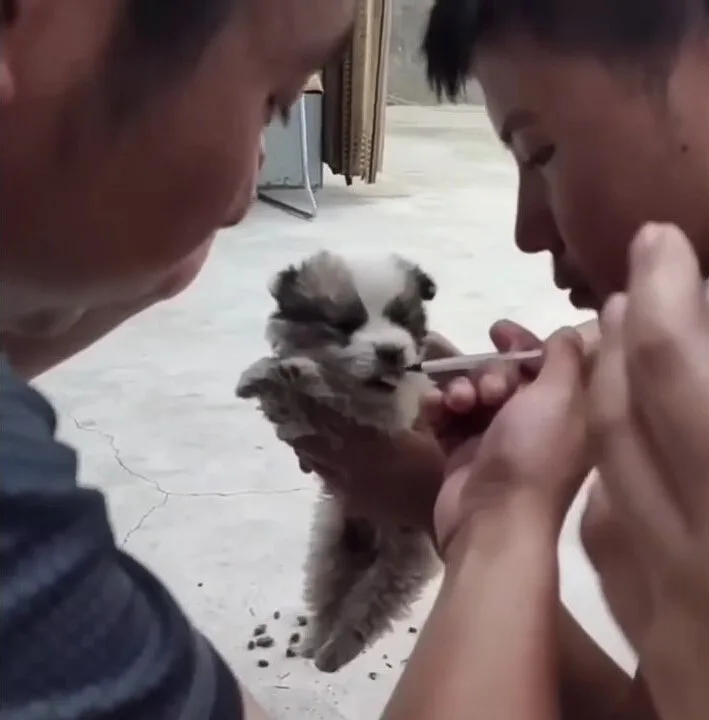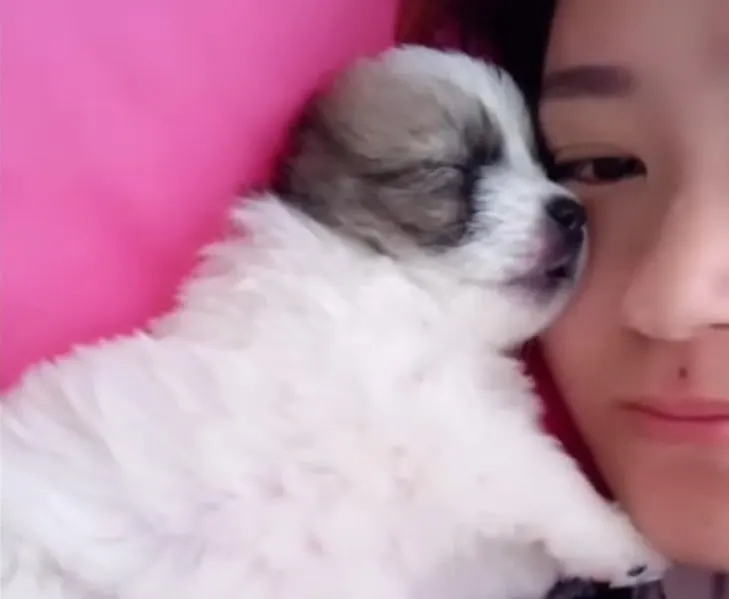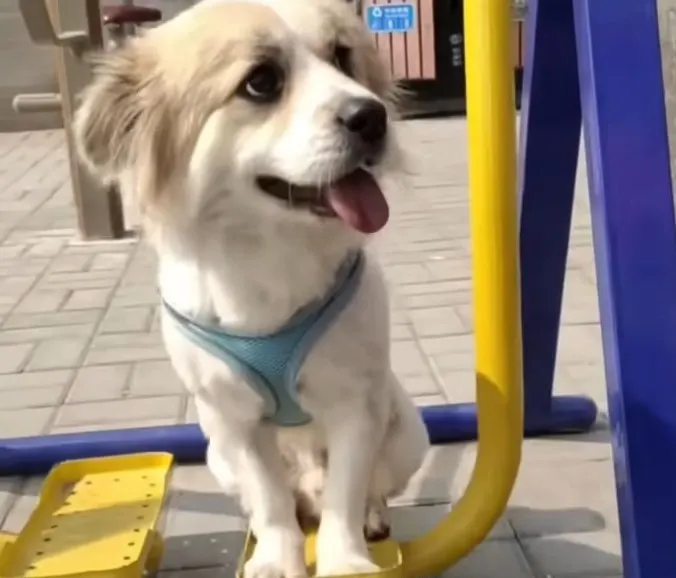Life on the streets is a constant battle for survival for all strays and abandoned dogs. Searching for pieces of food and staying out of harm’s way is extremely difficult.
For the tiny puppies who end up homeless and separated from their mom, surviving is close to impossible without unconditional love and care.
The following story is about a little fur baby who found himself all alone on the streets. He endured hunger for too long, and he couldn’t go on without help.
Unable to find food, the pooch with white fur was starving and lying unconscious on the side of a road. He needed his hero who would take him in their arms and get him the help he needed.
The Little Puppy In Need Of Help

A kind girl was returning home from work when she discovered a tiny puppy lying motionless on the side of the road. His white fur was covered with dirt. The pup’s eyes were closed, and his breathing was weak.
The girl was devastated to see the fur baby in such a condition. She immediately called a taxi and took the puppy to the vet.
After conducting a medical checkup, the vet determined that the pup suffered from fever and exhaustion because he had nothing to eat.

The vet team gave him medicine. Half an hour later, the puppy opened his eyes. Although he still had a fever, he felt better, and he was able to move.
The pup’s rescuer was overjoyed that the sweet fur ball would be alright.
Since all the puppy needed was rest, the vet determined that he didn’t need to stay at the hospital.
The Pup Feels Adored

The girl took the puppy home and bought him all the items that he needed.
She prepared him a nice and comfortable place to sleep and rest. The adorable fur baby slept a lot. He needed to regain his energy.
The next day, his fever was gone, and the resilient pup felt much better. He started exploring his surroundings.
The canine’s rescuer took excellent care of him, showering him with a lot of affection. The fur ball instantly bonded with her, and he looked at her with appreciation and love.

The puppy was happy to meet his rescuer’s other dog. The two canines played together and became the best of friends.
After a week, the fur baby made a complete recovery. He was very playful and energetic.
The pup spent a lot of time snuggling with his rescuer and her dog. The love they gave him helped him become a happier pup.
A Wonderful Life

The girl fell in love with the puppy and decided to make him a permanent member of the family. The pup’s eyes were twinkling with happiness because he had found a loving home.
Owing to the exceptional care of his mom, the pooch thrived and blossomed into a handsome pup with long, snowy white fur.
He loves going on walks and meeting new people.
The sweet pooch lives his best life, and he can’t stop smiling. He feels safe and adored in his forever home.
If you’ve ever been snuggled up with your furry friend and suddenly heard their stomach start to gurgle, you might wonder what’s going on in there. Dogs’ stomachs can make all sorts of interesting noises, and it’s not uncommon for pet parents to be a bit puzzled by it. As a seasoned dog trainer, you’re no stranger to the quirks of our canine companions, but the rumbling tummy can still raise a few questions.
When your dog’s belly starts to sound like a little symphony of gurgles, there could be a few reasons behind it. Understanding what might be causing these sounds can help you better care for your pup and ensure they’re feeling their best. So, let’s take a closer look at why your dog’s stomach is making all that noise.
Understanding Your Dog’s Digestive Sounds
What Are Normal Stomach Noises?
When it comes to your furry friend, it’s totally normal to hear some gurgling and rumbling coming from their stomach. These sounds are typically caused by the movement of gas and liquids in the intestines. Just like in humans, these noises usually indicate that your dog’s digestive system is working as it should. So, if you hear the occasional gurgle, there’s usually no need to worry.
When to Be Concerned
While normal stomach noises are nothing to fret about, there are times when unusual sounds may signal an underlying issue. If your dog’s stomach is excessively loud, accompanied by other symptoms like vomiting, diarrhea, or loss of appetite, it might be time to consult your vet. These signs could indicate digestive problems, dietary issues, or even more serious health concerns that require attention. So, trust your instincts and seek professional advice if you notice any concerning changes in your dog’s digestive sounds.
Common Causes of Stomach Gurgling in Dogs
Digestive Processes and Gas
When your furry companion’s stomach starts gurgling, it’s often a result of normal digestive processes. Just like in humans, the movement of gas and liquids in a dog’s intestines can create these sounds. It’s usually nothing to worry about and signifies that their digestive system is functioning as it should.
Hunger Pangs
Sometimes, your dog’s stomach may gurgle due to hunger. If your pup hasn’t eaten for a while, these hunger pangs can cause audible noises as the stomach contracts and signals that it’s time for a meal. It’s a common occurrence and often resolves once they’ve had their food.
Ingesting Air With Food
Dogs that eat too quickly or gulp down their food may also experience stomach gurgling. When they ingest air along with their food, it can lead to digestive noises. This is more common in breeds known for fast eating habits. Encouraging slower eating or using specialized bowls can help reduce this issue.
When Stomach Gurgling Indicates a Problem
Dietary Indiscretion and Irritation
Stomach gurgling in your dog can indicate issues like dietary indiscretion, where they may have eaten something that doesn’t agree with their stomach. This can lead to irritation in their digestive system, causing gurgling sounds. Keep an eye out for any recent changes in their diet or if they have access to foods they shouldn’t eat, like human food or garbage.
Intestinal Parasites
Intestinal parasites, such as worms, can also cause stomach gurgling in dogs. These parasites disrupt the normal functioning of the digestive system, leading to discomfort and audible stomach noises. If your dog has not been dewormed recently or exhibits symptoms like diarrhea or weight loss along with stomach gurgling, it’s essential to consult your vet for proper diagnosis and treatment.
Serious Gastrointestinal Issues
In some cases, persistent or severe stomach gurgling may indicate more serious gastrointestinal issues like pancreatitis, inflammatory bowel disease, or gastric dilatation-volvulus (GDV). These conditions require immediate veterinary attention as they can be life-threatening if left untreated. Look out for additional symptoms such as bloating, lethargy, or vomiting blood, and seek prompt medical care for your furry companion.
How to Respond to Your Dog’s Stomach Gurgling
Observing Your Dog’s Behavior
When your dog’s stomach is making gurgling noises, pay attention to their behavior. If they seem otherwise normal, it’s likely just their digestive system at work. However, if they are acting lethargic, vomiting, or have a reduced appetite, it may be a sign of an underlying issue that needs veterinary attention.
Dietary Adjustments
One way to respond to your dog’s stomach gurgling is by making dietary adjustments. Ensure you are feeding them high-quality food appropriate for their age and size. Consider smaller, more frequent meals to help with digestion. Avoid sudden dietary changes, as this can sometimes lead to stomach issues.
When to Visit the Vet
If your dog’s stomach gurgling is persistent, accompanied by other symptoms, or if you notice any changes in their behavior or appetite, it’s crucial to consult your vet. They can help identify the underlying cause of the gurgling and provide appropriate treatment. Remember, it’s always better to be safe and have your furry friend checked out by a professional.
Prevention and Management of Stomach Issues
Regular Feeding Schedule
To prevent stomach gurgling in your dog, stick to a regular feeding schedule. Feeding your furry friend at the same times each day helps regulate their digestive system, reducing the chances of gas build-up that can lead to noisy stomach sounds.
Choosing the Right Diet
Ensure your dog’s diet is suitable for their digestive health. Opt for high-quality dog food that meets their nutritional needs. Avoid sudden dietary changes as they can upset your dog’s stomach and cause gurgling. If you notice sensitivities to certain ingredients, consider a diet formulated for sensitive stomachs.
Probiotics and Digestive Supplements
Consider incorporating probiotics or digestive supplements into your dog’s diet to promote a healthy gut. Probiotics can aid in digestion and reduce stomach disturbances, while digestive enzymes help break down food more efficiently, lessening the likelihood of stomach gurgling. Consult your vet for recommendations on the best supplements for your furry companion.
Conclusion
Now that you understand why your dog’s stomach might be gurgling, remember that most of the time, it’s just a normal part of their digestive process. However, if you notice any unusual noises along with other symptoms like vomiting or loss of appetite, it’s best to consult your vet for a check-up. By maintaining a consistent feeding schedule, choosing the right food, and considering supplements, you can help keep your furry friend’s tummy happy and healthy. So, next time you hear those funny noises coming from your dog’s belly, you’ll know what to do!
Frequently Asked Questions
What causes stomach noises in dogs?
Stomach noises in dogs are typically caused by gas and liquid movement in the intestines, which is a normal part of the digestive process. Some common triggers include hunger pangs, ingesting air while eating, or the digestion of food.
When should I be concerned about my dog’s stomach noises?
You should be concerned if the stomach noises are accompanied by symptoms like vomiting, diarrhea, loss of appetite, or signs of distress. These could indicate underlying issues that may require veterinary attention.
How can I prevent or manage stomach issues in my dog?
To prevent stomach issues in dogs, maintain a regular feeding schedule, provide a balanced diet appropriate for your dog’s breed and age, and consider incorporating probiotics or digestive supplements to promote a healthy gut.
[no_toc]

Hey there, I’m Janet Brooks, a dog-loving student from California. I’m all about helping pups in need, especially those without homes. Me and my awesome friends work together to give shelter and love to stray dogs. Oh, and I also write blogs about dogs to share helpful info.